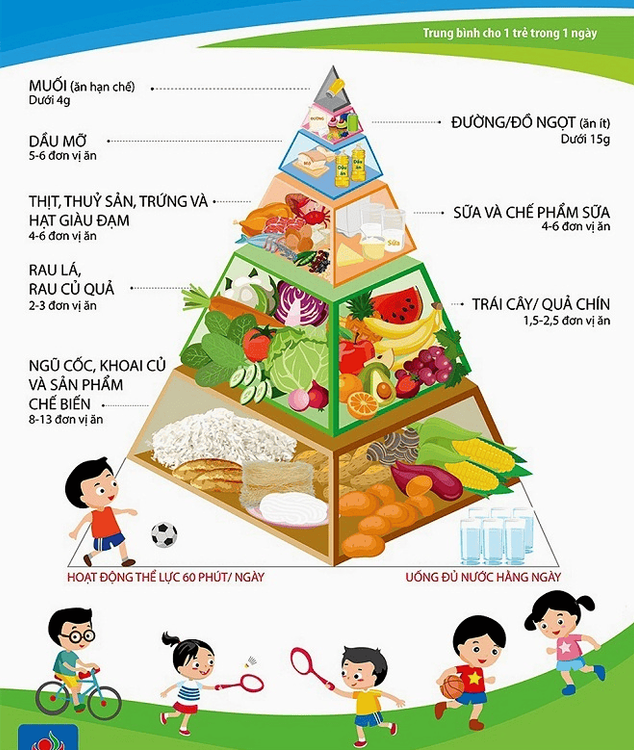This is an automatically translated article.
Nutrition for children under 5 years old is an issue of increasing concern. Children between the ages of 1 and 5 have relatively high growth and development needs. Parents can easily notice the change both physically and intellectually from day to day. Nutrition for children under 5 years old, if it is not met enough or is supplemented in excess, can leave negative impacts on the health of children now and in the future.
1. Nutrition for children under 1 year old
Children under one year of age are sensitive subjects in upbringing. The nutritional needs of children at this age are quite high, but the digestive system is not really fully developed. In addition, the feeding of children is hindered by a weak immune system, increasing the risk of infection.
The growth rate of children under 1 year old is usually quite high. Weight gain averaged 1000g/month in the first 3 months, 500g/month in the next 3 months and about 300g/month in the remaining 6 months. At 1 year of age, a healthy developing baby can weigh up to 3 times what it was at birth. The average height of children increases by 3cm/month in the first 3 months, 2cm/month in the next 3 months and about 1cm/month in the remaining 6 months. A healthy growing baby is 1.5 times taller at 1 year of age than at birth.
Nutrition for children under 1 year old needs to ensure enough energy to serve the body's internal metabolism, daily physical activity and growth. In which, the energy needed for metabolism inside the body accounts for more than 50%.

Trẻ em dưới 1 tuổi cần bổ sung nhiều dinh dưỡng để tăng trưởng và phát triển khỏe mạnh
In addition to ensuring adequate energy supply, nutrition for children under 1 year of age also needs to include all necessary groups of nutrients, including:
Protein: necessary for the growth of children. muscles, bones, and tissues in the body. Protein-rich foods that should be added to children are milk, meat, and eggs. For babies younger than 6 months, exclusive breastfeeding has been shown to provide enough protein for babies. Fats (lipids): are the most important source of energy-producing nutrients for children. In addition, the fat group is also a solvent that plays a supporting role in the absorption of a number of other nutrients such as vitamin A, vitamin D, vitamin E and vitamin K. Breast milk is a rich source of fats, especially long-chain double-chain fatty acids needed for brain development. When starting solids, children need to be supplemented with foods rich in lipids because at this time they will breastfeed less or stop altogether. Carbohydrates (glucid): Breast milk provides lactose, a type of carbohydrate that is easily absorbed by the baby's body. Carbohydrate needs increase more with age and should be provided from a variety of food sources as the baby begins to eat solids. Vitamins and Minerals: Breast milk is a good source of water-soluble vitamins, including vitamin C and the B vitamins. However, fat-soluble vitamins such as vitamin A and vitamin D need to be supplemented by supplementation. other. Vitamin A is stored in the liver from birth, depending on the mother's nutrition during pregnancy. Vitamin D is very low in breast milk, so it needs to be supplemented in the first week of life with an amount of about 200 IU per day. Calcium, iron, zinc are a group of minerals that should not be ignored for children under one year of age. Calcium supports the development of teeth and bones, provided mainly from breast milk in the first months. Iron is needed to make blood, but a normal baby will have enough iron stores for the first 3 months of life. Zinc is responsible for growth, appetite and immune system development of children.
2. Nutrition for children from 1 to 5 years old
Children between the ages of 1 and 5 have different changes compared to children under 1 year old. Physical and intellectual development happens at a slower pace but with significant milestones. Nutrition has been shown to play a decisive role in a child's development during the first years of life.
Nên bổ sung cho trẻ đa dạng các nhóm thức ăn để đáp ứng đủ các chất dinh dưỡng và đậm độ năng lượng
Children from 1-3 years old start to learn to walk, stand, and speak, so energy consumption will increase compared to children under 1 year old. The digestive system of children at this age is also gradually improved. The average energy requirement is about 1300 kcal per day. Similar to adults, children also need to be supplemented with a full range of nutrients including protein, lipid, glucide, vitamins and minerals. Food for children from 1 to 3 years old should be processed soft, gradually diversifying foods to avoid causing boredom for children. Remember to provide enough water for children.
Children from 3 to 5 years old: this is the age when children start participating in preschool classes. Nutrition for preschool children should be noted because the growth rate in this period is still fast. Weight increases on average 2kg per year and height increases about 7cm per year. Preschool children have more frequency and intensity of physical activity, so their energy needs are also higher, about 1600 kcal per day. Protein, lipid and glucide should be supplemented in a balanced way, with priority given to protein sources from foods of animal origin. Practicing and forming eating habits and science is a must at this age.
In order for children to be healthy and develop well both mentally and physically, it is necessary to have a nutritious diet in terms of quantity and quality balance. If children are not provided with adequate and balanced nutrients, it will lead to diseases of excess or lack of nutrients that adversely affect the comprehensive development of children in terms of physical, mental and motor skills.
Children who do not eat properly are at risk of micro-mineral deficiency causing anorexia, growth retardation, malabsorption,... If they notice the above signs, parents should supplement their children with products. The supplement contains lysine, essential micro-minerals and vitamins such as zinc, chromium, selenium, and B vitamins to help fully meet the nutritional needs of children. At the same time, these essential vitamins also support digestion, enhance nutrient absorption, help improve anorexia, and help children eat well.
Parents can learn more:
Signs of zinc deficiency in children
Micronutrient deficiency and failure to gain weight in children
Please dial HOTLINE for more information or register for an appointment HERE. Download MyVinmec app to make appointments faster and to manage your bookings easily.













